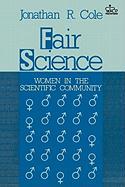Fair Science
BücherAngebote / Angebote:
Columbia University sociologist Jonathan Cole credits his mother for the reference to Gray's "Elegy" which provides the book's charming title (pun intended) and its leitmotif: while women scientists were clearly discriminated against in the past, the academic community now "distributes its resources and rewards in an equitable fashion, " though the results show some puzzling anomalies. Where residual inequality persists, without doubt, is in rank and salary: women are not promoted as fast or as high in the hierarchy, and at equal rank, they are not paid as well. These conclusions derive from Cole's detailed study of some 600 men and women who acquired Ph.D.s in 1957 and 1958 in the physical, biological, and social sciences. Men and women were matched for specialty, year of degree, and degree-granting university. They were followed over the next decade or so with careful measures of performance (quzlity and quantity of papers published), honors, recognition, and the like. Cole's data reveals that there was no discrimination in terms of access to elite graduate schools or fellowships. But he found that - for reasons unknown - women generally were less well recognized and produced fewer and less notable publications. His explorations of the many variables which influence women's choices and paths through the system, his clear delineation between conjecture and fact, and his impeccable handling of data are models of analysis. Yes, there are thickets of correlation coefficients and regression analyses, the inevitable tables and charts, and some closely argued points which together establish the book as a work of scholarship. But Cole as expositor and clarifier is excellent. When he deals with imponderables like colleague Robert Merton's "haunting presence of functionally irrelevant statuses" (essentially the dilemma of dissonance of status and career - black physician, female scientist, etc.), when he reviews the contribution of IQ or traces the development of women in science against a century's changing cultural values, he mines a rich lode of ideas which underscores the subtlety and sophistication of his thinking. He does, in the end, argue cautiously for maintaining some forms of affirmative action for women, fully aware of the problems that beset any attempt to lump all minorities together. Shrewd and sturdy. (Kirkus Reviews)
Folgt in ca. 15 Arbeitstagen

